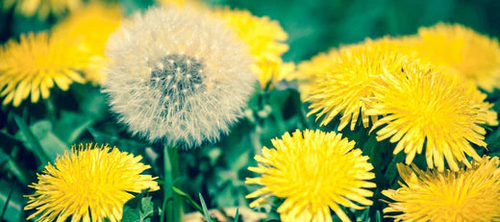A Dandy Assignment
Dandelion season is once again upon us.
There’s a lot to love about these ubiquitous “weeds,” which grow in abundance on every continent, including Antarctica.
They’re beautiful. Their very name (from dent de lion, French for “lion’s tooth,” a description of their jagged green leaves), generates smiles.
They can even be described as a super-food. Every part is edible.
The French, for instance, make a dynamite cream of dandelion soup. The leaves are prized as salad greens. They contain an abundance of vitamins A, C, and K, and are good sources of calcium, potassium, iron, and manganese.
Roasted dandelion roots can be turned into a caffeine-free coffee. The Brits have also transformed them into a soft drink. The yellow flower petals can be used to make dandelion wine. And since one of the medicinal uses of dandelions is to combat hangovers, this plant seems to solve the very problems it creates.
So why do Americans think dandelions are from the Dark Side? Why does their presence in your next-door neighbor’s yard inspire righteous indignation?
The answer is that we love our green lawns. And anything that seems to threaten our turf must be the enemy. But it’s a fight we can never win. In terms of biological survival, dandelions are dazzlingly successful.
Individual plants can live as long as 5-10 years. In other words, some of them might live longer on your property than you will.
What drives homeowners crazy is what we often see the morning after we finish mowing. How is it possible that dozens of white “pom-poms” are standing on 6-8 inch stalks as if we missed them altogether? In truth, you probably didn’t miss. But when the yellow petals go to seed, dandelion stalks can grow almost as fast as bamboo – quite literally while we are sleeping – so the tiny white seed-bearing parachutes have a better chance of being caught by the next breeze.
During America’s early years, when dandelions were cherished, it was said that those little white seeds were carried on the winds to the property of the one you love. If that’s so, then my yard this month is proof that I am more loved right now than I have ever imagined.
Professor Marsha Linehan writes about a homeowner who was intent on cultivating the greenest turf in his neighborhood.
His dandelions simply had to go.
He dug them up. He treated his lawn with herbicides. He pled with his neighbors to keep their dandelions in check. He went so far as to resod his yard with special weed-resistant grass.
But a handful of resilient dandelions were inevitably able to sneak back in.
After consulting every book on the market and chatting up every local landscaper within driving distance, he appealed to the U.S. Department of Agriculture. When their written response arrived, he eagerly tore open the envelope. Here’s what he found:
“Dear Sir, we have considered your problem and consulted all of our experts. After careful consideration, we think we can give you very good advice. Sir, our advice is that you learn to love those dandelions.”
Our call is to learn to love the dandelions in our life.
We may write off certain high-maintenance friends, neighbors, and family members as “weeds,” but God happens to think they are beautiful.
The apostle Paul challenges us, “Do you have any business crossing people off the guest list or interfering with God’s welcome? If there are corrections to be made or manners to be learned, God can handle that without your help” (Romans 14:4, The Message).
Then he adds, later in the same chapter, “It’s God we are answerable to—all the way from life to death and everything in between—not each other. That’s why Jesus lived and died and then lived again: so that he could be our Master across the entire range of life and death, and free us from the petty tyrannies of each other” (14:8-9).
We may try everything in our power to evade or “fix” the EGRs in our world – those Extra Grace Required individuals who just keep messing up our efforts to cultivate our own “perfect” lives.
But it will never happen. The EGRs just keep showing up.
We can always take a different approach, of course.
We can humbly agree with God that we happen to be Extra Grace Required people, too.
And we can ask him for the grace to do what he does with all of the world’s human dandelions:
We can learn to love them.
*************************************************
Would you like to explore previous reflections, and learn more about this ministry? Check out glennsreflections.com. |
|
|
Copyright © 2025 glennsreflections.com, All rights reserved.
Glenn McDonald is an ordained Presbyterian minister, has 45 years of congregational and workplace leadership experience, and is the author of ten books on discipleship and spiritual formation. He and Mary Sue have four children, nine grandchildren, and enjoy living on a small horse farm not far from Indianapolis.
|
|
|

No Comments